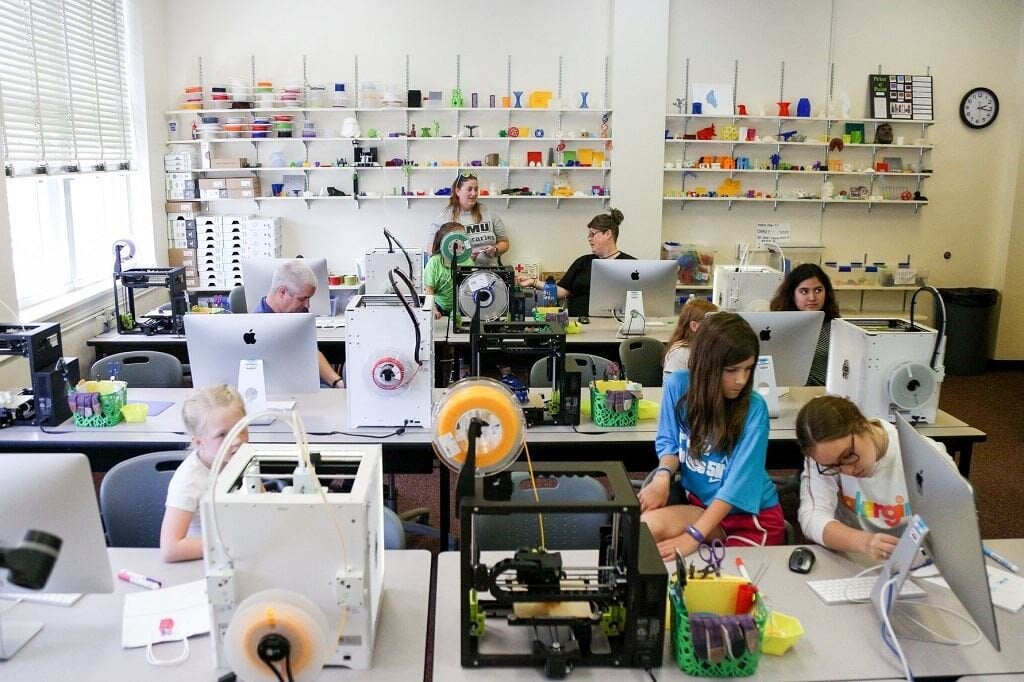![#MakerGirlGoesMobile2019 included a 3D printing workshop at the JMU 3SPACE in Harrisonburg, Virginia [Image: JMU Innovation Services]](https://fabbaloo.com/wp-content/uploads/2020/05/makergirljmu_img_5eb0902f14188.jpg)
STEM (Science, Technology, Engineering, and Math) and STEAM (adding in the Arts) education is more important than ever for the next generation — but it isn’t always accessible, or equitable.
It’s a fact that girls and women are still underrepresented in STEM programs and the careers that come from them; the numbers are skewed toward the historical significant majority of boys and men in these areas. We don’t always want to acknowledge that fact, but it’s there. And that includes in 3D printing.
Women of 3D Printing
Numbers don’t lie. Women hold a minority of the jobs in the 3D printing industry; estimates in vetted surveys place that around 11% and our own reader survey is relatively consistent, placing our readers around 14% female.
This is all a matter close to my heart, as one of these relatively few women making a living in 3D printing. So close, indeed, that for the past two years I’ve been authoring the semiannual Diversity for Additive Manufacturing reports for Women in 3D Printing — an organization on which I sit on the Board of Directors. One of my joys in working with Fabbaloo is the support this publication has always shown for Women in 3D Printing; our VP of Business Development, Marney, is the local ambassador for the Winnipeg chapter, and our Founder, Kerry, has long been supportive, sharing Wi3DP’s weekly interviews here for years.
I’m lucky. I work with a team — indeed, choose only to work with any clients — who actively support diversity in 3D printing. And that’s a choice I have been privileged to make, after some relatively happenstance circumstances led me to this field in the first place.
But, and hear me out here, what if it didn’t take happenstance, circumstance, and privilege for women to have a positive working situation in a field like advanced manufacturing?
What if doors were simply open? What if these paths were clearly laid out from an early age, with the assumption that of course girls might have interest in STEM subject areas? What if ratios looked more like the closer-to-50/50 split of the general population?
STEM Education Support
Initiatives are popping up around the world to support more diversity and inclusion in STEM areas.
One of these is Illinois-based MakerGirl, which was founded in 2014 when Julia Haried and Elizabeth Engele were asked “What bothers you?” in the context of their social entrepreneurship class at the University of Illinois at Urbana-Champaign. For Haried, part of what bothered her was the scarcity of women in C-suite positions; Engele “immediately wanted to inspire her female peers on campus.” So they founded MakerGirl.
The nonprofit focuses on seven-to-ten-year-old girls, offering education through workshops in 3D printing and other advanced technologies. And they’ve just gotten a nice boost in a significant new partnership.
MakerGirl and EOS North America recently entered into a three-year funding partnership, MakerGirl’s largest to date.
MakerGirl is expanding, and the funding is set to help establish two new Academies as the project moves to more states. The University of Michigan and University of Texas at Austin will welcome the newest Academies, with EOS employees volunteering with the workshop process.
Access is important, and the expansion is helping that along. Since 2014, more than 3,800 girls have participated in these workshops. Another important aspect of inspiring more diversity is mentorship, especially from mentors who look like their students. Part of the partnership with EOS will involve their team coming to the 3D printing sessions to share their own perspectives and knowledge.
“When I met EOS (Laura Gilmour and Stephanie Kochbeck, EOS leaders in business development), for the first time to discuss a potential investment in MakerGirl, I knew immediately that they were enthusiastic about our mission and eager to assist us in educating young girls in any way possible. Not only was it a conversation about whether EOS would work with us, it also led to how they could help MakerGirl meet our ambitious expansion goals,” said Elizabeth Engele, MakerGirl Co-Founder and Executive Director. “EOS understands the importance of gender equality and getting girls interested in STEM at a young age.”
For their part, those from EOS who helped to form this partnership recognize the benefits of working with the youth community, including sharing their own journeys.
“As the daughter of an engineer and a nurse, I was fortunate to be exposed to making things at an early age: the family legend is I built a house when I was 5 years old,” said Laura Gilmour, Global Medical Business Development Manager, EOS North America. “My early exposure to engineering fundamentals turned into a desire to study biomedical engineering and become a medical device R&D engineer. I am a real-life example that exposure to engineering concepts at an early age cultivates an interest in STEM. I believe this partnership with MakerGirl will give other young women this opportunity, even if they do not have an engineer as a father.”
The onus is on us, the current generation of the workforce, to help establish a fairer baseline for the next generation — generations — to start with a more equitable stance to find the fields that interest them. I hope we’ll continue to see partnerships like this one pop up around the world, starting young with inspiration and building the confidence to explore interests that might not look like what used to be expected.
Via MakerGirl

